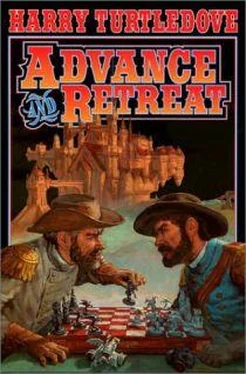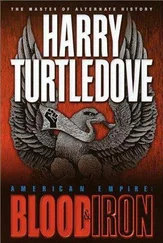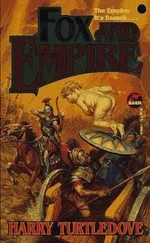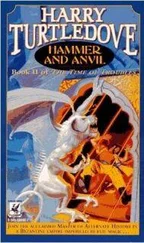“They’ve got soldiers along with their wizards,” Rollant said. “If they overrun us, we don’t get another chance to build the bridge. Besides” — he touched his crossbow, which leaned against his leg, ready to grab and pull and shoot- “anybody who tries overrunning me’ll have to kill me first.”
That wasn’t just bravado. He meant every word of it. Detinans had forced blonds in the north into serfdom because the blonds hadn’t been able to fight enough, all those centuries ago, to keep their kingdoms from being overwhelmed. Ever since then, northern Detinans had figured blonds couldn’t fight-and had taken elaborate precautions to make sure they never got the chance. The Detinans didn’t notice the paradox. Blonds did-but who cared what blonds noticed?
If Lieutenant General Bell’s men captured Smitty, he’d go into a prisoners’ camp till he was exchanged for some northerner. If Bell’s men captured Rollant, he’d go, in chains, back to the estate from whose lands he’d presumed to abscond with himself. He knew his old liege lord was dead. He’d shot Baron Ormerod himself, up at the top of Proselytizers’ Rise. But whoever owned Ormerod’s land these days still had a claim to the serfs tied to it. Whoever that was had a claim under the laws of Palmetto Province, anyhow. Rollant was rude enough to think himself entitled to the fruits of his own labor, and ready to fight to hold on to that freedom to work for himself.
Out beyond the trenches were holes in the ground sheltering the pickets who would slow down any northern attack. Out beyond the pickets were the scouts and sentries who would spot the attack before it rolled over the southrons. That was how things were supposed to work. Most of the time, they did. Every once in a while… Rollant didn’t want to think about all the things that could go so gruesomely wrong.
For now, Bell’s soldiers didn’t care to close with John the Lister’s men. Soldiers who followed both Avram and Geoffrey had, in this fourth year of the war, become very cautious about rushing earthworks. That wasn’t to say they wouldn’t, but it was to say they looked for the likelihood of reward before pressing an assault to the limit. Rollant had seen up in Peachtree Province how important entrenchments were. Bell’s men had fought there, too. They were traitors, but they weren’t morons.
An ass-drawn wagon driven by teamsters in King Avram’s gray rattled past the sentries, past the pickets, and through a gap in the entrenchments not far from the position of Rollant’s company. Another followed, and another, and another. They carried logs with one end sharpened to a point: pilings for the southrons’ next effort at a bridge.
Smitty watched them go by with world-weary cynicism. “Wonder if they’ll do any better than they did the last time,” he said, and then, before Rollant could answer, “Don’t suppose they could do much worse.”
“We have to get over the Trumpeteth,” Rollant said. “We have to. Once we’re back in Poor Richard, Bell won’t dare give us any trouble.”
“Who knows what Bell will dare?” Smitty said.
“Well, he’d be an idiot if he did,” Rollant said. “If he wants to be an idiot, that’s fine with me.”
“Me, too.” Even the argumentative Smitty didn’t seem inclined to disagree with that. “Now, if I were Bell, I’d dress some of my boys up in gray and let ’em sneak through our lines. They could have us trussed and tied before we even know what’s going on.”
“That’s a dreadful idea!” Rollant exclaimed in horror.
Smitty bowed, as if at praise. “I like it, too.”
For a heartbeat, Rollant thought the farmer’s son had misheard him. Then he realized Smitty was just being his perverse self. Acknowledging him only made him worse. Rollant said, “One of these days, Smitty…”
“I know,” Smitty said. “But I’ll have fun till then.”
At dawn the next morning, heavy stones and firepots started landing in and around the entrenchments. “The traitors must have brought their engines up during the night,” Rollant said.
Smitty bowed again. “Thank you so much for that brilliant deduction, Marshal Rollant, your Grace, sir.”
“Oh, to the hells with you,” Rollant snapped. “Can’t anybody say anything without getting it twisted around and shot back at him?”
At that moment, a stone slammed into the parapet in front of them, showering them both with dirt. Rollant rubbed at his face. Smitty spat-spat brown, in fact. “Wouldn’t you sooner have me shooting words at you than the traitors shooting big rocks?” he said, and spat again. “My mouth’s full of grit.”
“So is mine,” Rollant said, “but I got some in my eye, too.”
About fifty yards down the trench line, another stone thudded home. Two men shrieked. Rollant and Smitty exchanged dismayed glances. Rollant wondered whether the stone had hit any other soldiers and killed them outright before maiming the two who cried out. It could have. He knew that altogether too well.
Lieutenant Griff said, “We are going forward, men, to capture those engines or destroy them or make the northerners pull them back.”
No one grumbled, even though coming out of the trenches was risky. This way, they could hit back. Nothing was harder to bear than staying in place and taking a pounding without being able to repay the damage in kind. Even Rollant, who would carry the company standard and wouldn’t do any actual fighting out in the open till he got close enough to the enemy to chop with his shortsword, only nodded.
Out of the trenches swarmed the men in gray. “Avram!” they shouted. “Avram and freedom! King Avram!”
Crossbow bolts hissed through the air at them. Bell had brought men forward to defend his engines, too. Rollant sighed. He’d known Bell would. “Geoffrey!” the northerners shouted, and, “Provincial prerogative forever!”
Provincial prerogative, as far as Rollant was concerned, meant nothing except the privilege of treating blonds like beasts of burden. He waved his standard, gold dragon on red, high above his head. False King Geoffrey’s partisans flew the same flag with the colors reversed.
Pok! A crossbow bolt tore through the silk. The standard had already taken a number of such wounds. Another bolt hissed past Rollant’s ear, this one not from in front of him but from behind. One of his own comrades was shooting carelessly at the traitors. Rollant hoped the fellow was shooting at them, anyhow.
Bell’s men hadn’t had time to entrench as well as Rollant was sure they would have liked. Some of them crouched behind stumps and rail fences. Others stood or knelt on one knee or lay on their bellies in the open. Seeing the men in blue-some of them in southron gray ineptly dyed blue-roused Rollant to fury, as it always did. These were the men who wanted to tie him to a little plot of land for the rest of his days. He whooped with glee when one of them crumpled to the ground, clutching at himself and kicking.
“Come on!” he shouted to his own comrades, waving the standard again. “Let’s get rid of all these bastards!”
They didn’t get the chance. Perhaps Bell hadn’t expected John the Lister’s men to sally so aggressively against his men. In this part of the field, southrons outnumbered northerners, though Lieutenant General Bell’s army was a lot bigger than John’s. The traitors hitched their catapults to asses and unicorns and hauled them away. The crossbowmen and pikemen protecting them fought a rear-guard action till the valuable engines had escaped. Then they too fell back.
Rollant was all for charging after them. His superiors weren’t. The trumpeters blew withdraw . Reluctantly, he returned to the southrons’ trench line. Litter bearers hauled back the wounded and the dead. Healers and surgeons would do what they could for the wounded. Soldiers and runaway serfs now laboring in Avram’s army would have to chop wood for the pyres of the dead. Rollant likely would have drawn that duty before he got promoted. Not now, not as a corporal.
Читать дальше












